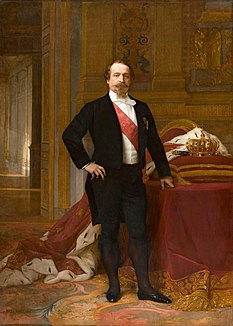Napoleon III
| Napoleon III | |||||
|---|---|---|---|---|---|
 |
|||||
| Emperor of the French | |||||
| Reign | 2 December 1852 – 4 September 1870 |
||||
| Predecessor |
Monarchy re-created Louis Philippe I as King of the French |
||||
| Successor |
Monarchy abolished Louis Jules Trochu as President of the Government of National Defense |
||||
| Cabinet Chiefs | |||||
| 1st President of France | |||||
| In office | 20 December 1848 – 2 December 1852 |
||||
| Predecessor |
Republic re-created Louis-Eugène Cavaignac as Chief of the Executive Power |
||||
| Successor | Republic abolished | ||||
| Prime Ministers | |||||
| Born |
20 April 1808 Paris, French Empire |
||||
| Died | 9 January 1873 (aged 64) Chislehurst, Kent (now Greater London), England |
||||
| Burial | St Michael's Abbey, Farnborough, Hampshire, England | ||||
| Spouse | Eugénie de Montijo | ||||
| Issue | Louis Napoléon, Prince Imperial | ||||
|
|||||
| House | Bonaparte | ||||
| Father | Louis I of Holland | ||||
| Mother | Hortense de Beauharnais | ||||
| Religion | Catholicism | ||||
| Full name | |
|---|---|
| Charles Louis Napoléon Bonaparte |
|
Royal styles of Napoleon III of France |
|
|---|---|
 |
|
| Reference style | His Imperial Majesty |
| Spoken style | Your Imperial Majesty |
| Alternative style | Sire |
Louis-Napoléon Bonaparte (born Charles-Louis Napoleon Bonaparte; 20 April 1808 – 9 January 1873) was the only President (1848–52) of the French Second Republic and, as Napoleon III, the Emperor (1852–70) of the Second French Empire. He was the nephew and heir of Napoleon I. He was the first President of France to be elected by a direct popular vote. He was blocked by the Constitution and Parliament from running for a second term, so he organized a coup d'état in 1851 and then took the throne as Napoleon III on 2 December 1852, the forty-eighth anniversary of Napoleon I's coronation. He remains the longest-serving French head of state since the French Revolution.
During the first years of the Empire, Napoleon's government imposed censorship and harsh repressive measures against his opponents. Some six thousand were imprisoned or sent to penal colonies until 1859. Thousands more went into voluntary exile abroad, including Victor Hugo. From 1862 onwards, he relaxed government censorship, and his regime came to be known as the "Liberal Empire." Many of his opponents returned to France and became members of the National Assembly.
Napoleon III is best known today for his grand reconstruction of Paris, carried out by his prefect of the Seine, Baron Haussmann. He launched similar public works projects in Marseille, Lyon, and other French cities. Napoleon III modernized the French banking system, greatly expanded and consolidated the French railway system, and made the French merchant marine the second largest in the world. He promoted the building of the Suez Canal and established modern agriculture, which ended famines in France and made France an agricultural exporter. Napoleon III negotiated the 1860 Cobden–Chevalier free trade agreement with Britain and similar agreements with France's other European trading partners. Social reforms included giving French workers the right to strike and the right to organize. Women's education greatly expanded, as did the list of required subjects in public schools.
...
Wikipedia
